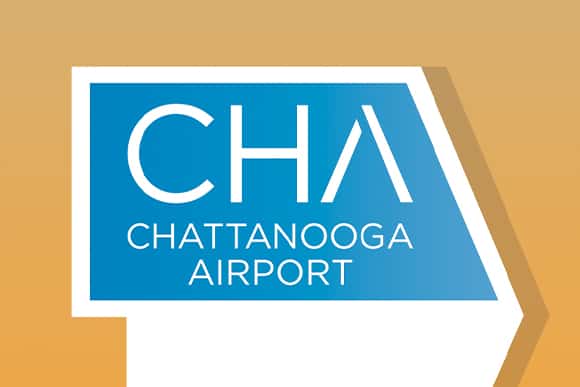
Chattanooga Metropolitan Airport
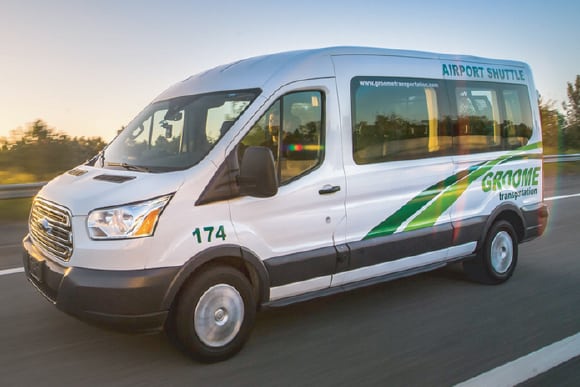
Groome Transportation
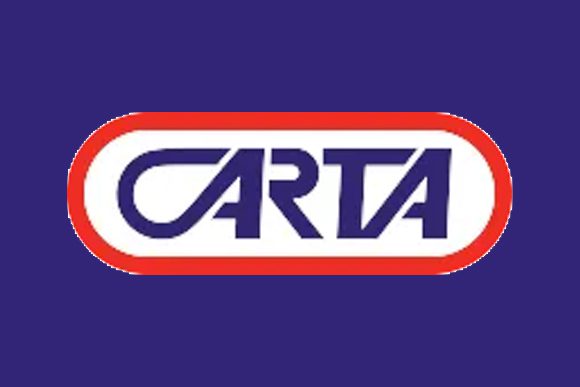
CARTA
Traveling in and around the Scenic City is made convenient by the city’s prime location and natural features. From major interstate systems to thriving waterways, Chattanooga maintains a strong commitment to providing efficient and accessible transportation options for all.
River transportation has flourished along the Tennessee River and its tributaries for as long as people have settled in the Tennessee Valley. Today, commercial navigation of the waterways continues to save hundreds of millions of dollars in transportation costs by transporting over 50 million tons of goods every year, according to the Tennessee Valley Authority (TVA).
Similarly known as one of Chattanooga’s oldest transportation systems, the railways have a rich history of supporting the local economy. The first rail line, the Western and Atlantic Railroad, was completed in 1850 and made way for the commercial rail transportation of today. Currently, several companies such as Norfolk Southern and CSX carry freight through the city each day.
On top of its river location and prime railways, Chattanooga is also known as “Freight Alley” and “the Silicon Valley of trucking” for its proximity to major interstate systems. Its optimal position at the convergence of I-75, I-59, and I-24 make it an attractive base for trucking companies, including Covenant Logistics and U.S. Xpress. Third party logistics companies also thrive here, with familiar names such as Kenco Logistics, Coyote Logistics, LogistiX, Trident Transport, and Steam Logistics.
Chattanooga Metropolitan Airport (CHA) continues to see impressive growth while receiving recognition for its commitment to sustainability. The airport’s most recent expansion officially opened in March of 2024, adding 26,000 square feet for two new gates, more efficient boarding and deplaning, restrooms, concessions, and more. In addition to previously established nonstop flights to major hubs such as Charlotte, Dallas, and Atlanta, CHA began offering nonstop flights to Las Vegas and resumed nonstop service to New York City in 2024. CHA has also announced a new nonstop flight from Chattanooga to Punta Gorda, starting in February 2025.
Bolstering Chattanooga’s transportation systems on the ground is the Chattanooga Area Regional Transportation Authority (CARTA). Operating one of the largest fleets of electrical buses in the country, CARTA runs 15 fixed bus routes and manages the free Downtown Electric Shuttle system. With new funding awarded by the Federal Transit Authority (FTA) in 2024, CARTA continues to uphold its innovative legacy with plans to explore options for a high capacity transit corridor along Brainerd Road/Lee Highway starting in 2025.
Another sustainable and cost-effective option is Bike Chattanooga. Offering 450 regular and electronic bikes across 43 stations in the city, locals and visitors alike can enjoy convenient rental access throughout the year. Protected bike lanes and updated bicycle facilities continue to be established around the city, including a new multi-modal lane on Frazier Avenue as of 2024.
Electric vehicles also have an advantageous position in the Scenic City. Committed to increasing public access to sustainable transportation options, Chattanooga continues its collaboration with CARTA, TVA, and the State of Tennessee to install more electric vehicle charging stations along major routes. Thirty-one additional fast-charging stations are expected to be installed across the state within the next two years, thanks to a $21 million grant issued by the Tennessee Department of Transportation and Department of Environment and Conservation.
Bike Chattanooga gives city bikers convenient access to 450 regular and electronic bikes available across 43 stations in the city. Riders have the option of a daily pass for $10, 3-day pass for $20, or annual pass for $50.
Hamilton County’s public transit system, the Chattanooga Area Regional Transportation Authority (CARTA), reliably transports roughly 3 million passengers each year. In addition to the Downtown Electric Shuttle, CARTA operates the Care-a-Van service for the disabled and the Lookout Mountain Incline Railway.
he public transit system for Hamilton County and the surrounding areas. CARTA manages the Care-a-Van service for the disabled, the Downtown Electric Shuttle, downtown parking, and the Lookout Mountain Incline Railway. CARTA also has 17 fixed bus routes serving Chattanooga with fares beginning at 75 cents per ride.
Take flight from the Chattanooga Metropolitan Airport (CHA), which has many of the services of a much larger airport without the extra stress. CHA offers convenient parking options, LEED-certified facilities, and a number of nonstop flights through major airlines Delta, United, Allegiant,
and American Airlines.
Across from the Chattanooga Metropolitan Airport is the fixed base operator (FBO) Wilson Air Center, which provides highly-rated services to private air travelers. Professional Pilot magazine named Wilson Air Center the most improved FBO in the country in 2024, and plans are underway to develop Hixson’s Dallas Bay Skypark into a private fly-in community.
Electric vehicle operators have access to over 300 public charging stations in the Chattanooga region, including areas such as Lookout Mountain, Hixson, East Brainerd, and Ooltewah. Out of the stations in the area, 39 are free, and 49 are fast charging stations.
Groome Transportation is a convenient option for an airport-to-city shuttle. Located in East Ridge, Groome operates daily trips between the Scenic City and nearby Nashville International Airport and Atlanta’s Hartsfield-Jackson Airport.
All interstates lead to the Scenic City, or so it seems. Chattanooga’s sweet spot along I-24, I-59, and I-75 connects it to nearby major cities in the Southeast, including Nashville, Knoxville, Atlanta, and Birmingham.
Some of the nation’s top logistics providers gravitate to the convenient location and thriving entrepreneurial spirit of the Scenic City. Chattanooga is host to the annual Future of Freight Festival, which unites leaders and experts to forecast market trends in the industry. Several local businesses have been featured on the 2024 Inc. 5000 list of “Fastest Growing Companies in America,” including Steam Logistics, MOCA Logistics, KCH Transportation, Taimen Transport, Trident Transport, Max Trans Logistics of Chatta-nooga, and AHS Consulting.
Two major railway companies connect Chattanooga to the rest of the country and support supply chains. Norfolk Southern’s Crescent Corridor spans 2,500 miles from New Jersey to Louisiana, and CSX railways cover more than 1,500 miles of track throughout the state of Tennessee.
Sometimes called “Freight City,” Chatta-nooga is popular among trucking companies for its strategic location in the Southeast. U.S. Xpress, Covenant Logistics, Shah Trucking & Logistics, and Tranco Logistics call the Scenic City home, providing long-distance trucking and the distribution of raw materials and finished goods to manufacturers.
Connected to a wealth of inland rivers, the Tennessee River has an essential role in transporting raw and finished goods throughout the Southeast. Several terminals operate along the river, with companies like Serodino, Inc. transporting more than 2 million tons of cargo annually.
Traveling in and around the Scenic City is made convenient by the city’s prime location and natural features. From major interstate systems to thriving waterways, Chattanooga maintains a strong commitment to providing efficient and accessible transportation options for all.
River transportation has flourished along the Tennessee River and its tributaries for as long as people have settled in the Tennessee Valley. Today, commercial navigation of the waterways continues to save hundreds of millions of dollars in transportation costs by transporting over 50 million tons of goods every year, according to the Tennessee Valley Authority (TVA).
Similarly known as one of Chattanooga’s oldest transportation systems, the railways have a rich history of supporting the local economy. The first rail line, the Western and Atlantic Railroad, was completed in 1850 and made way for the commercial rail transportation of today. Currently, several companies such as Norfolk Southern and CSX carry freight through the city each day.
On top of its river location and prime railways, Chattanooga is also known as “Freight Alley” and “the Silicon Valley of trucking” for its proximity to major interstate systems. Its optimal position at the convergence of I-75, I-59, and I-24 make it an attractive base for trucking companies, including Covenant Logistics and U.S. Xpress. Third party logistics companies also thrive here, with familiar names such as Kenco Logistics, Coyote Logistics, LogistiX, Trident Transport, and Steam Logistics.
Chattanooga Metropolitan Airport (CHA) continues to see impressive growth while receiving recognition for its commitment to sustainability. The airport’s most recent expansion officially opened in March of 2024, adding 26,000 square feet for two new gates, more efficient boarding and deplaning, restrooms, concessions, and more. In addition to previously established nonstop flights to major hubs such as Charlotte, Dallas, and Atlanta, CHA began offering nonstop flights to Las Vegas and resumed nonstop service to New York City in 2024. CHA has also announced a new nonstop flight from Chattanooga to Punta Gorda, starting in February 2025.
Bolstering Chattanooga’s transportation systems on the ground is the Chattanooga Area Regional Transportation Authority (CARTA). Operating one of the largest fleets of electrical buses in the country, CARTA runs 15 fixed bus routes and manages the free Downtown Electric Shuttle system. With new funding awarded by the Federal Transit Authority (FTA) in 2024, CARTA continues to uphold its innovative legacy with plans to explore options for a high capacity transit corridor along Brainerd Road/Lee Highway starting in 2025.
Another sustainable and cost-effective option is Bike Chattanooga. Offering 450 regular and electronic bikes across 43 stations in the city, locals and visitors alike can enjoy convenient rental access throughout the year. Protected bike lanes and updated bicycle facilities continue to be established around the city, including a new multi-modal lane on Frazier Avenue as of 2024.
Electric vehicles also have an advantageous position in the Scenic City. Committed to increasing public access to sustainable transportation options, Chattanooga continues its collaboration with CARTA, TVA, and the State of Tennessee to install more electric vehicle charging stations along major routes. Thirty-one additional fast-charging stations are expected to be installed across the state within the next two years, thanks to a $21 million grant issued by the Tennessee Department of Transportation and Department of Environment and Conservation.
Bike Chattanooga gives city bikers convenient access to 450 regular and electronic bikes available across 43 stations in the city. Riders have the option of a daily pass for $10, 3-day pass for $20, or annual pass for $50.
Hamilton County’s public transit system, the Chattanooga Area Regional Transportation Authority (CARTA), reliably transports roughly 3 million passengers each year. In addition to the Downtown Electric Shuttle, CARTA operates the Care-a-Van service for the disabled and the Lookout Mountain Incline Railway.
Take flight from the Chattanooga Metropolitan Airport (CHA), which has many of the services of a much larger airport without the extra stress. CHA offers convenient parking options, LEED-certified facilities, and a number of nonstop flights through major airlines Delta, United, Allegiant,
and American Airlines.
Across from the Chattanooga Metropolitan Airport is the fixed base operator (FBO) Wilson Air Center, which provides highly-rated services to private air travelers. Professional Pilot magazine named Wilson Air Center the most improved FBO in the country in 2024, and plans are underway to develop Hixson’s Dallas Bay Skypark into a private fly-in community.
Electric vehicle operators have access to over 300 public charging stations in the Chattanooga region, including areas such as Lookout Mountain, Hixson, East Brainerd, and Ooltewah. Out of the stations in the area, 39 are free, and 49 are fast charging stations.
Groome Transportation is a convenient option for an airport-to-city shuttle. Located in East Ridge, Groome operates daily trips between the Scenic City and nearby Nashville International Airport and Atlanta’s Hartsfield-Jackson Airport.
All interstates lead to the Scenic City, or so it seems. Chattanooga’s sweet spot along I-24, I-59, and I-75 connects it to nearby major cities in the Southeast, including Nashville, Knoxville, Atlanta, and Birmingham.
Some of the nation’s top logistics providers gravitate to the convenient location and thriving entrepreneurial spirit of the Scenic City. Chattanooga is host to the annual Future of Freight Festival, which unites leaders and experts to forecast market trends in the industry. Several local businesses have been featured on the 2024 Inc. 5000 list of “Fastest Growing Companies in America,” including Steam Logistics, MOCA Logistics, KCH Transportation, Taimen Transport, Trident Transport, Max Trans Logistics of Chatta-nooga, and AHS Consulting.
Two major railway companies connect Chattanooga to the rest of the country and support supply chains. Norfolk Southern’s Crescent Corridor spans 2,500 miles from New Jersey to Louisiana, and CSX railways cover more than 1,500 miles of track throughout the state of Tennessee.
Sometimes called “Freight City,” Chatta-nooga is popular among trucking companies for its strategic location in the Southeast. U.S. Xpress, Covenant Logistics, Shah Trucking & Logistics, and Tranco Logistics call the Scenic City home, providing long-distance trucking and the distribution of raw materials and finished goods to manufacturers.
Connected to a wealth of inland rivers, the Tennessee River has an essential role in transporting raw and finished goods throughout the Southeast. Several terminals operate along the river, with companies like Serodino, Inc. transporting more than 2 million tons of cargo annually.
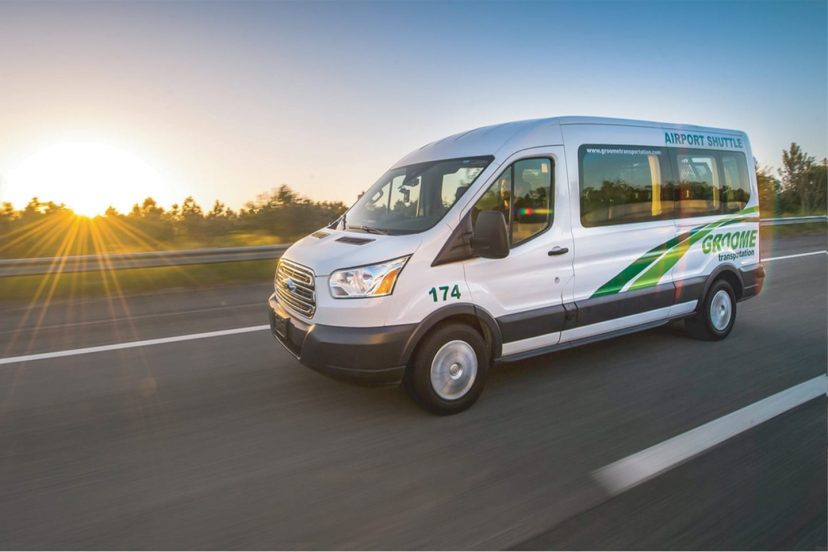
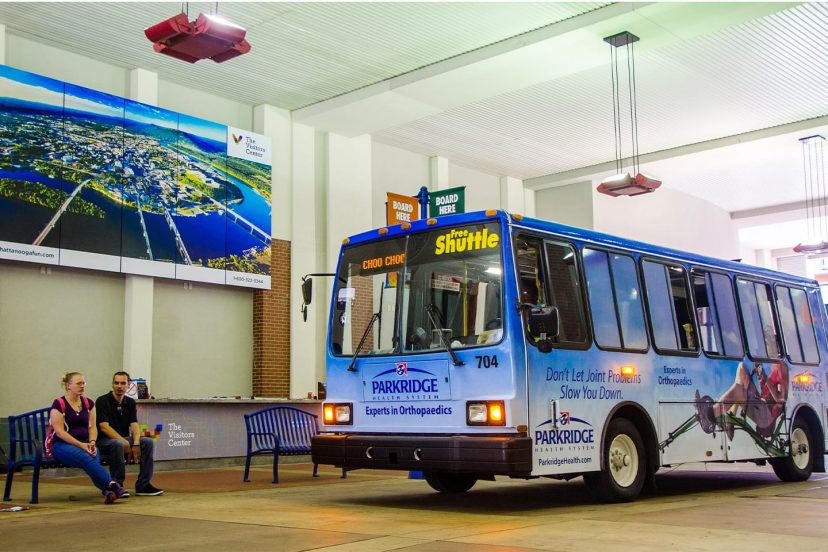

Sign up for our monthly Choose Chatt™ newsletter, What’s Happening in the Scenic City!
Site by Digital Smart Marketing